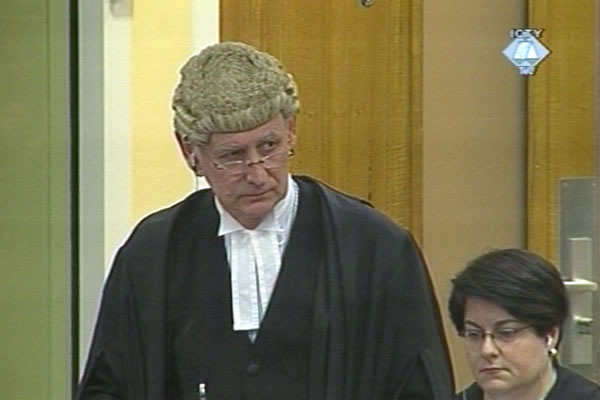Home
DEFENSE CALLS FOR ACQUITTAL OF CERMAK AND MARKAC
The defense teams of the former Knin Garrison commander Ivan Cermak and Croatian Special Police chief Mladen Markac called for their acquittal on all charges in the indictment for crimes in Operation Storm. The prosecution has failed to call valid evidence on their participation in the joint criminal enterprise aimed at permanent elimination of Serbs from Krajina, they claim
 Steven Kay, branilac Ivana Čermaka
Steven Kay, branilac Ivana Čermaka Yesterday, Ante Gotovina’s defense presented its arguments under Rule 98 bis. Today, the defense teams of generals Ivan Cermak and Mladen Markac were given their chance to argue why in their view the prosecution failed to call enough evidence which, if accepted, would have resulted in their conviction. Ivan Cermak and Mladen Markac are on trial together with Gotovina for their participation in the joint criminal enterprise during and after Operation Storm in the summer of 1995 whose objective was to expel the Serbs from Krajina.
Defense counsel Kay believes that the prosecution has failed to call any evidence that General Cermak had command responsibility over the units of the Croatian Army and military and civilian police in Krajina during and after Operation Storm. According to Kay, the evidence can only lead to a conclusion that Cermak as the Knin Garrison commander had only nine soldiers under his command: none of them committed any crimes. Cermak, Kay argued, had ‘a logistic non-operative’ role: normalize life in Knin and its surroundings after Operation Storm and to liaise with international representatives.
It is the international representatives, Kay contends, who are responsible for the misconception of Cermak’s role in Krajina and the prosecution ‘has bought it’. As the defense counsel explained, international observers saw Cermak as ‘military governor’, a man who could do something to prevent crimes and punish the perpetrators. Cermak did promise them something like that, the defense counsel agreed, but soon learned he had ‘limited authority’; this rendered him unable to ‘deliver’ on his promises.
The international observers, Cermak’s defense counsel noted, were responsible for ‘propounding the theory’ of joint criminal enterprise, as they claimed that the looting and arson of Serb houses in Krajina after Operation Storm were part of a plan put together by the Croatian authorities and the accused generals. There was no plan at all, Kay claims; the crimes were committed by civilians and demobilized and/or active soldiers’ who committed crimes out of revenge and not on the orders of their commanders. Even if the Trial Chamber finds that the existence of the joint criminal enterprise has been proven, the defense counsel emphasized that his client could not have been a participant as ‘a planner’. Cermak was appointed commander of the Knin Garrison on 5 August 1995 when Operation Storm was already launched. When Cermak was appointed, Kay noted, he was ‘a civilian in uniform’ who spoke against crimes in his public addresses; that is not typical of a person who wants to expel Serbs from Krajina, Kay added.
[IMAGE]4008[/IMAGE]Markac’s defense counsel Tomislav Kuzmanovic relied on the arguments presented yesterday by Ante Gotovina’s defense. According to Kuzmanovic, the ‘cornerstone’ of the joint criminal enterprise theory lies in the prosecution’s claim that the towns and villages in Krajina were unlawfully shelled with the aim of forcing the Serb civilians to flee. There is no evidence of shelling in the areas where the Croatian special police was launching attacks. The prosecution has likewise failed to prove that the Croatian special police took part in the looting and arson, Kuzmanovic added; findings of guilt could not be based solely on their presence near the crime scenes. During Operation Storm, special units moved at great speed, and even if they wanted to, they ‘didn’t have the time’ to burn down and loot, Kuzmanovic said.
Kuzmanovic focused on the murder of five elderly Serbs in the village of Grubori. The crime has been blamed on the special police. As Kuzmanovic argued, the perpetrators of the crime have remained unidentified because the Croatian civilian police ‘didn’t do its job’ and didn’t investigate the incident properly. Markac, the defense counsel contends, did everything in his power: he sent the commander of the Special Police Staff Sacic to the crime scene. Sacic then told Cermak that five elderly persons had been killed when the special forces and remnants of the Serb army clashed in the village of Grubori.
Cermak’s and Markac’s defense teams called for the acquittal of their clients. They believe that the prosecution hasn’t presented evidence to support any of the nine counts in the indictment charging them with murder, persecution, deportation, forcible transfer, looting, destruction and inhumane treatment. On Monday the prosecution will reply to the defense 98 bis arguments.
Linked Reports
- Case : Gotovina et al. - "Operation Storm"
- 2009-03-19 DEFENSE CALLS FOR GOTOVINA’S ACQUITTAL ON ALL CHARGES
- 2009-03-05 PROSECUTION RESTS ITS CASE AT OPERATION STORM TRIAL
- 2009-02-23 WITNESS CONTESTS BRIJUNI TRANSCRIPTS
- 2009-03-23 PROSECUTION: ENOUGH EVIDENCE AGAINST CROATIAN GENERALS
- 2009-03-24 DEFENSE: 'PROSECUTION'S LEGAL HODGEPODGE'
- 2009-03-25 BREAK OR END FOR OPERATION STORM TRIAL?
